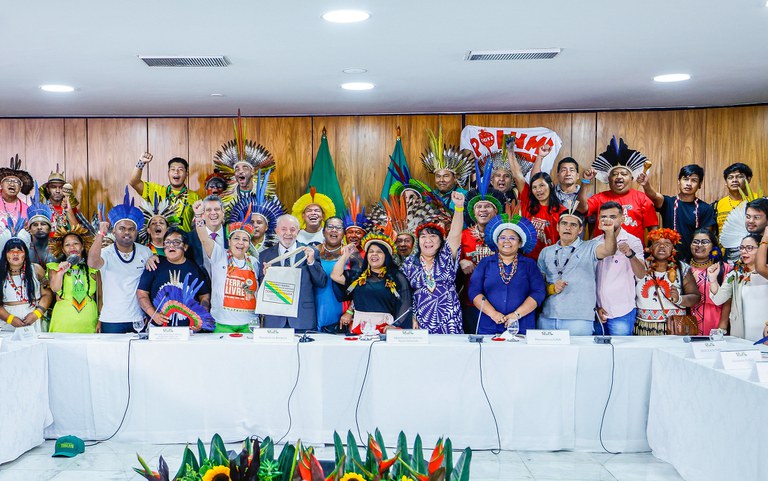Notícias
INDIGENOUS LANDS
President Lula reaffirms commitment to the homologation of Indigenous Lands and summons a Task Force

President Luiz Inácio Lula da Silva, during a meeting with leaders and coordinators of indigenous organizations. - Credit: Ricardo Stuckert / PR
The President of the Republic, Luiz Inácio Lula da Silva, hosted a meeting with Minister Sonia Guajajara, secretaries from the Ministry of Indigenous Peoples (MPI), and representatives from the Articulation of Indigenous Peoples of Brazil (APIB) at the Planalto Palace this Thursday (25), in Brasilia. The meeting was centered on the need for coordination among ministries and other agencies to advance the homologation of four Indigenous Lands (Terras Indígenas - TI) still pending.
The President declared that a Task Force will begin the resolution process to sign the homologations in Santa Catarina, Paraíba, and Alagoas in two weeks. The Task Force will be led by MPI in collaboration with the Indigenous Peoples National Foundation (Fundação Nacional dos Povos Indígenas - FUNAI), the President of the Republic’s Secretary-General, the Federal Attorney General's Office (Advocacia-Geral da União - AGU), the Ministry of Justice (MJ) - responsible for issuing declaratory ordinances - , and the Ministry of Agrarian Development, represented by the National Institute of Colonization and Agrarian Reform (INCRA).
“The homologations cannot be signed in disregard of all the non-indigenous occupations that exist within these territories. The Government must create the conditions for these people to leave and be resettled as soon as possible. A dialogue with the governors has been proposed to collaboratively address this social issue. We cannot solve one historical problem and then create another one. The responsible agencies must coordinate it together,” said Minister Sonia Guajajara.
President Lula responded to an urgent request from the indigenous movement to expedite the homologation process, as the Federal Government had committed to delivering 14 Indigenous Lands and ensured swift progress in the homologation process. According to Márcio Costa Macedo, Minister-Chief of the General Secretariat of the Presidency of the Republic, there are approximately 800 occupations by family farmers in the territory located in Paraíba and another 400 in Alagoas.
"I consider today to be a historic day. The president listened to all the leaders, and the Government reaffirmed its commitment to the homologations. He mentioned that the establishment of the Task Force should determine what needs to be done to finalize the homologations. Two of them, in Santa Catarina, face legal issues and are currently in the hands of Justice Gilmar Mendes at the Supreme Court, while the others have political issues due to occupations," reported Macedo.
Among the representatives from MPI was the secretary of Environmental Territorial Management (SEGAT), Ceiça Pitaguary, the National Secretary of Indigenous Territorial Rights, Marcos Kaingang, the Coordinator of Indigenous Social Rights, Jecinaldo Sateré, and the President of FUNAI, Joenia Wapichana.
“The indigenous movement reached a consensus to wait for the result of the Task Force so that we can advance together in the homologation process. FUNAI will continue to play its role as the executor of indigenist policies and do the work to make the demarcations advance with subsidies in any needed instances, be it in the Judiciary or via administrative procedures because this is a responsibility of the Brazilian Government and State towards the indigenous peoples”, stated Wapichana.
MARCH TO THE PLANALTO - Last Thursday (18), during the reinstation session of the Indigenist Policy National Council (Conselho Nacional de Política Indigenista - CNPI) at the Palace of Justice, the President signed the homologation of two Indigenous Lands. At the session, he explained to the indigenous movement representatives that four other homologations still required dialogue with State governments to ensure the peaceful removal of the occupiers from the demarcated areas so that the fulfillment of the processes could happen with no setbacks.
As the meeting with the president unfolded, thousands of indigenous representatives marched down the Esplanade and gathered in front of the Palace, holding banners, posters, and flags to demand action from the State. The purpose of the march is to accelerate homologations, resolve territorial disputes, ensure public safety for indigenous communities, and secure approval for indigenous-focused projects in the National Congress.
The protest is part of the Acampamento Terra Livre - ATL(in English, “Free Land Camp”). Held from Monday to Friday (22 to 26) in Brasília, the twentieth edition of ATL has the theme "Our demarcation is ancestral" and is attended by thousands of indigenous representatives from across the country. ATL takes place every April, recognized as the month of indigenous resistance and achievements in Brazil.
“In the conversation with the President, we stressed the need to accelerate the demarcation process and to strengthen FUNAI and MPI. In our view, there are no legal impediments, but rather a political impediment we hope can be resolved. The Task Force is a demand from the movement to unlock the demarcations of Indigenous Lands, not only the four Lands or the 25 that currently stand as declaratory ordinances [at the Ministry of Justice]. We want the problem to be resolved for good,”, stated APIB’s executive coordinator Dinamam Tuxá.
One of the primary demands of the indigenous movement, APIB, and ATL at large is the repeal of the temporal landmark law, the “Marco Temporal” (14,701/23), passed by the National Congress in 2023. This law mandates the demarcation of national indigenous territories based only on boundaries predating the 1988 Constitution. This rollback is considered regressive not only by MPI but by the broader Brazilian indigenous community.
Source: Ministry of Indigenous Peoples - Brazil.

